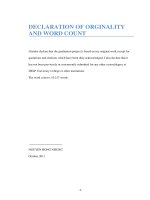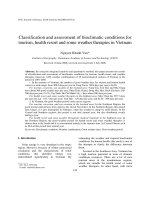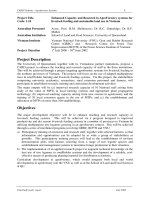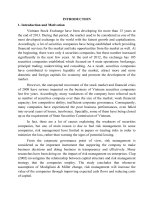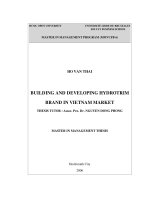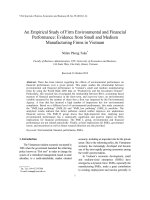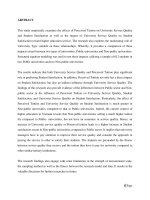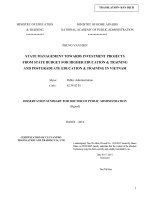Bond and Stock Valuation Vietcombank in Vietnam TCDN NEU
Bạn đang xem bản rút gọn của tài liệu. Xem và tải ngay bản đầy đủ của tài liệu tại đây (28.26 MB, 22 trang )
Bond and
Stock
Valuation
VIETCOMBANK
Instructor:
Mr. Pham Van Tue Nha
Our group consists of 5 members:
1.Bùi Thu Trang
2.Nguyễn Thị Minh Tú
3.Lê Hải Yến
4.Trần Đỗ Hồng Minh
5.Lê Đình Duy
Due to limited information search time and
limited knowledge, the report inevitably
contains
subjective
and
incomplete
judgments. Our team is looking forward to
receiving comments and sympathy from
lecturers and readers.
"
We sincerely thank you!
TABLE OF
CONTENTS
Introduction
Discussion
01
02
Introduction of the company
Bond and stock valuation of the
company
03
Bank-specific valuation methods
04
Recommendations to the company
and investors
Conclusion
References
Introduction
In the past 10 years, the industrial revolution 4.0 has
brought great leaps to the industry in Vietnam. Entering
2022, the impact of Covid-19 will no longer disrupt the
strong development cycle of the banking system.
Concerns about the risk of bad debt will cool down from
the end of the first quarter of 2022 along with the
recovery of the economy will be the driving force for
banks to maintain the growth rate and achieve stable
profits. Therefore, we have chosen Vietcombank as the
subject for our presentation on stock and bond
valuation.
We would like to thank Mr. Pham Van Tue Nha for
bringing us interest in the subject of Corporate Finance
1. We hope to receive your comments on this report.
Discussion
I. INTRODUCTION
- Full name: Joint Stock Commercial Bank
for Foreign Trade of Vietnam.
- HOSE Code: VCB
- VCB provides finance services:
+ VCB mainly focus on commercial
banking activities with the traditional
sector being wholesale banking (business
serving corporate customers).
+ Retail banking activities:
Working in the consumer sector
Real estate lending services mortgage loans, home loans…
Financial services business serving
individual customers
+ Insurance:
Life insurance business
Non-life insurance, reinsurance
+ Investment bank:
Trading and investing in stock
Asset/investment fund management
activities
Financial services for buying, selling,
splitting, merging companies
+ Non-financial activities:
Trading and investing in real estate
Invest in the construction and
development of infrastructure projects
History of establishment and development:
Vietcombank was founded on 1
April 1963 as the Bank for
Foreign Trade of Vietnam. It
was spun off from the State
Bank of Vietnam to be an
exclusive bank for foreign
trade.
In 1990, Vietcombank started
to diversify its services. In
1996 the official name was
changed
to
Joint
Stock
Commercial Bank for Foreign
Trade of Vietnam.
On
June
30,
2009,
Vietcombank shares (stock
code VCB) were officially
listed on the Ho Chi Minh
City Stock Exchange.
Over nearly 60 years of
growth,
Vietcombank
is
considered as a key external
bank, contributes effectively
to economic development in
the country, and has impacts
on the regional and global
financial community.
II. EVALUATING
1. Bond
THEORY
1. What is bond
valuation?
2. How to price a
bond?
Bond valuation is a technique
for determining the theoretical
fair value of a particular bond.
Bond
valuation
includes
calculating the present value of
a
bond's
future
interest
payments, also known as its
cash flow, and the bond's value
upon maturity, also known as its
face value or par value. Because
a bond's par value and interest
payments are fixed, an investor
uses
bond
valuation
to
determine what rate of return is
required for a bond investment
to be worthwhile.
Pricing a Bond in Steps: Since a
bond
pays
periodic
coupon
payments and a lump sum (par
value) at maturity, its price is
best calculated by using the
following steps:
Step 1. Lay out the cash flows on
a timeline;
Step 2. Determine an appropriate
discount rate (yield to maturity);
Step 3. Calculate the present
value of the coupons and the par
value;
Step 4. Add up the two present
values to calculate the bond
price.
- Formula:
- Key Bond Terms include:
Par value: The principal or face value of a bond on which interest is paid,
typically $1000
Coupon rate: Annual rate of interest paid by issuing (borrowing)
companies.
Coupon: The regular interest payment received by the buyer. It is
calculated as the product of the coupon rate and the par value (and
divided by 2, if semi-annual)
Maturity date: The expiration date of the bond on which the final coupon
and the principal value is paid by the issuer.
Yield to maturity: The discount rate or expected rate of return on a bond
(it is the bondholders’ rate of return) which is used to determine its price.
Current price: Depending on the level of interest rate in the environment,
the investor may purchase a bond at par, below par, or above par. For
example, if interest rates increase, the value of a bond will decrease
since the coupon rate will be lower than the interest rate in the economy.
When this occurs, the bond will trade at a discount, that is, below par.
However, the bondholder will be paid the full face value of the bond at
maturity even though he purchased it for less than the par value.
trang 05
Bond valuation of Vietcombank
Type of bond: non-convertible corporate bond
Form of bonds: issued in the form of journal entries
Issuance purpose: Vietcombank will issue separate bonds in
2022 to increase tier-two capital to supplement capital and
meet Vietcombank medium and long-term lending needs for
socio-economic development. At the same time, the bond
issuance aims to improve Vietcombank's financial capacity.
Issuance method: through an issuing agent (Joint Stock
Commercial Bank for Foreign Trade of Vietnam Securities
Company Limited) in the form of a private placement. Most
of the bond was
With a par value of 1 billion VND, it will be difficult for
individual investors to buy, so all bonds of VCB are owned
by
large
enterprises
(more
specifically,
insurance
companies).
* Problem: Vietcombank Securities Co Ltd (VCBS) issued 800
bond notes to investors on 15/07/2022. The face value of the
bond had been set at 1.000.000.000 VND. The total value of
issued bonds worthed 8.000.000.000.000 VNĐ. The maturity of
the bond is 15 years and interest will be paid annually. The
yield to maturity on these bonds is 5%. The bond has a coupon
rate of 6.8 percent per year for the first 10 years from the issue
date, and for the next 5 years, the coupon rate will be 7 percent
per year. What is the current bond price?
2. Stock
In 2009, Vietcombank shares were officially issued on HCM Stock
market (HOSE).
After 13 years of trading on the stock exchange, there was a time
when its stock price in the market was traded for 100,000/share in
February recently. The current price has increased by 171.07%,
proving that the real value of the stock is getting higher and higher,
and the bank itself is also developing well year by year. At the same
time, the liquidity of VCB stock was maintained and increased by the
tastes of investors in the market. Not only in the domestic market,
the number of foreign investors matching orders for VCB shares has
been quite high for many years because of its prestige as well as
potential for development and growth. The profit of the firm rarely
reported a loss despite the COVID-19 pandemic.
Their dividend was alway pay by money (800 VND/share) from 2015
to 2019, last year (2020) dividend was 1200 VND per share and 276
stocks for every 1000 stocks you owned. This 6 year period has been
cycling for the whole last decade and we think that it will continue in
the future.
DEFYING THE PRICE OF
THE STOCK:
Stock valuation is the process of valuing companies and comparing the
valuation to the current market price to see whether a stock is over- or
undervalued.
Stock valuation can be classified into two categories: absolute valuation and
relative valuation.
Stock valuation is very common to Bond valuation,the only different is
that the money you gain is increasing steadily over time
In the case that you only hold the stock for a few years:
=> P0= PV1 + PV2 +.....+PVn
In the case that you hold it forever for dividend:
T = year (counting from the issued year)
PV= value after discount (present value)
Stock current dividend:
800 VND for 5 years, might continue in the future.
1200 VND for last year dividend and stock dividend (1000/276), which will
happen at the end of a period
-> Average money paid = 900 VND/stock
->Average Growth rate = 27,6%/6= 4.6% but because the next stock dividend
can be 1000/40
-> Expected average Growth rate ~ 8%
DEFYING THE PRICE OF
THE STOCK:
If the required return is 15% (there is many risk such as inflation is
around 4% cause increasing in bank interest, bad debts might be
appeared more as the result, and we have to wait for the economy
recovering and end of world financial crisis caused by Ukraine-Russia
war. But in contrast, the bank has prepared for this situation by a fund
with a huge amount of bad debt allowance money, and the bad debt rate
of VCB is the lowest in the second quarter of 2022. Moreover, FED end
others central bank has started to adapt the situation and Europe show a
positive sigal when there fuel tank has full for this winter which mean
the wheel of economy will run smoothly in the future.
Therefore, the price for the dividend if you owned 1 stocks is:
The dividend is great. Compared to others such as BIDV, a big bank
that is late in paying dividends throughout history with less profit
(around 700 in average) and only paid dividends by stock
approximately 100:26 and only 200 VND/stock in the 2021, VCB is
much more profitable and more stable. The price of VCB on the stock
market also shows much higher growth potential than BIDV, whose
stock price is now equal to 2018 while VCB almost 1.5 more valuable
than its in late 2019
III. BANK-SPECIFIC
VALUATION METHODS
1. Evaluating the bank's performance
Besides valuation by the above method, people often use the formulas called P/B
and ROE, because these two formulas give more accurate results.
a) P/B ratio:
The P/B ratio (Price to Book ratio) is an important financial ratio, used to
compare the price of a stock with its book value. The P/B ratio is often used for
valuation because of the peculiarity of the banking group that is based on the
performance of assets. When there is a change in asset quality, returns will vary
greatly.
Comparing P/E and P/B:
P/E ratio
Often used to evaluate
businesses with relatively
stable and less volatile
profits such as: Production
enterprises.
Easy to evaluate and
calculate due to the small
degree of data deviation,
maily in terms of business
cash flow to see if the
enterprise has real income
from main business or not.
P/B ratio
Often used to evaluate
businesses that mainly
increase asset value but
have unstable profits and
high liquidity such as
financial and real estate
businesses.
It is more difficult to
evaluate because it is
necessary to determine the
fair value of each asset in
the balance sheet or asset
quality like bank loans.
- Calculation formula:
- The P/B ratio will show how many times the stock price is higher than the
book value of the business.
A high P/B ratio means that the market is expecting a very good future
business prospect. Therefore, investors are willing to pay more for the book
value of the business.
A low P/B ratio means the actual market value of the business is much
lower than its Book Value. Besides, the business is in the recovery phase (of
a business cycle), the P/B ratio is also low, but business results gradually
improve, profits increase, helping to increase book value. In this case, the
stock is undervalued and this is an opportunity for investors to buy.
- Example: Vietcombank's P/B ratio is 71.8/26.7 = 2.69
b) ROE index
"A great company isn't necessarily
the biggest company, it's the
company that delivers the most
value to shareholders."
Warren Buffett
Therefore, ROE (Return on Equity) is an indicator that measures the
efficiency of the use of equity in a business. It is used to assess the
efficiency of capital use, identify a competitive advantage of the business
compared to other competitors in the industry.
General
formula
The higher the ROE ratio, the more effectively the company uses the
capital of its shareholders. It means that the company has harmoniously
balanced between shareholder capital and borrowed capital to exploit its
competitive advantage in the capital raising process and scale expansion.
At the present time, a good ROE is estimated to be between 18 - 20%.
However, Vietcombank's ROE is at a very high level, about 22.03%. This
is the company with the highest ROE among the Big 4 banks.
c) Relationship between P/B and ROE
The relationship between P/B ratio and ROE index should also be
considered when evaluating a bank. Normally, P/B will be proportional to
ROE because investors are willing to pay a higher price to buy shares of
a company that gives them more profit.
Vietcombank is an example for this case, when both the P/B and ROE
ratios of this bank are high.
2. Bad debt assessment and bad debt
coverage ratio:
In addition, people also evaluate the bad debt of banks. Total bad debts as
of September 30, 2022 of Vietcombank increased by 47% compared to the
beginning of the year, accounting for nearly 9,004 billion VND of total
outstanding loans.
Besides, Vietcombank's allowance for bad debts reached 402%, the
highest among commercial banks.
c) Relationship between P/B and ROE
IV. RECOMMENDATION
1. Recommendation for investors
Stock
Firstly, although there were many times when bank stocks dropped in price
like the Covid 19 epidemic in 2019-2021, the banking industry still recovered
quickly. Therefore, large-scale commercial bank stocks like Vietcombank
are always "hunted" by investors. Vietcombank always keeps the bad debt
ratio at a very low level.
Secondly, the valuation of VCB stock is always higher than that of other
banks. The provision of Vietcombank is currently 98% higher than the
average level of the private banking system in Vietnam.
Therefore, Vietcombank is worth investing in because of its profitability and
development potential. Usually, the end of the year often witnesses an increase
in bank value. Investors can take advantage of taking profits at this time.
1. Recommendation for investors
Bond
Currently, Vietcombank's largest shareholder is
the National Bank, which holds 74.8% of the
capital, so it is certainly difficult to go bankrupt
or cheat, so if you choose to buy bank bonds,
Vietcombank's bonds are the most trusted.
The term of Vietcombank bonds is 10 years, but
bondholders can invest flexibly. Because, after 5
years from the date of issuance, Vietcombank will
buy the bonds back. Moreover, after 2 years from
the issuance date, the Bonds could be pledged at
Vietcombank and other banks to borrow money at
preferential interest rates.
The interest rate of Vietcombank is also very
high, often more than 8.5%/year.
Lastly, Vietcombank bonds are highly liquid and
the bank is always in the top, so there is no need
to worry much about the money spent.
Therefore, VCB bonds are the safest medium and
long-term investments
2. Recommendations for banks
Stock
Maintain business operations
effectively to create stability in
business development. Thanks
to this, the share price can
increase and attract more
investors.
Transparency of the Company's
information to investors can
stabilize investor sentiment and
avoid stock devaluation.
Because VCB's share value is at
a high level (share value on
5/11/2022 is 71.8 thousand
VND), it is necessary to split
shares to reduce share value
and increase dividend. From
there, bank can attract more
retail investors with little
capital.
Bond
Bank bonds are issued for a
long time so it is difficult for
newbies to buy Vietcombank
bonds. Therefore, bank should
create
short-term
bond
periods to attract more
investors. At the same time,
strengthen and improve the
capital control system to
avoid financial risks.
From there, effectively divide
the use into non-banking
fields such as guarantee,
currency
brokerage,
real
estate,...
Conclusion
Up to now, Vietcombank has maintained
a very high growth rate and is the
highest among the top 4 banks in the
industry. Vietcombank's bonds are
purchased, then redistributed by large
and reputable investors. This is a safe
medium and long term investment
channel. Vietcombank shares still
maintain a stable price and have strong
growth potential, especially from the
end of 2022 to the beginning of 2023.
References
01. />02. />03. />04. />05. />
Thank
You
